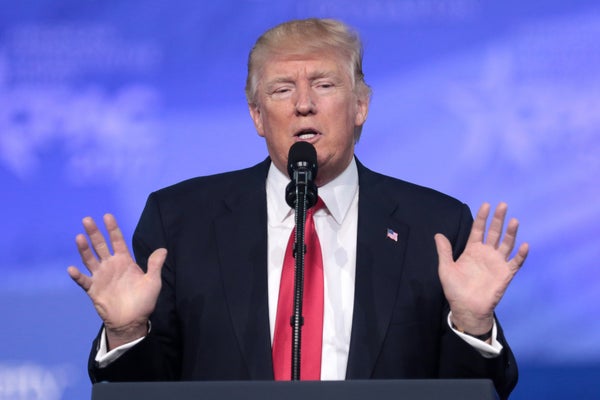After an outcry, the Trump administration has rolled back a proposed gutting of the Office of National Drug Control Policy, instead asking for relatively small trims to the office and largely preserving two main grant programs.
President Trump’s 2018 budget—released Tuesday—is just a proposal; Congress actually allocates government spending.
Still, the budget outlines the administration’s priorities, and an email leaked earlier this month showed that Trump was considering cutting the office’s $364 million budget by 95 percent. Those cuts would have eliminated two major grant programs the office coordinates: the drug-free communities program, which helps build coalitions to decrease substance use, and the high-intensity drug-trafficking area programs, which helps state and local law enforcement agencies fight drug trafficking.
On supporting science journalism
If you're enjoying this article, consider supporting our award-winning journalism by subscribing. By purchasing a subscription you are helping to ensure the future of impactful stories about the discoveries and ideas shaping our world today.
Instead, the Trump administration is proposing allocating $244 million to the drug-trafficking program, down from $247 million in the 2017 budget. For the communities program, the administration wants to spend $92 million, compared to $95 million last year.
For the operations of the office, Trump is proposing a $2 million trim, from $20 million to $18 million.
Politico first reported the revised plans for the office’s budget.
After the potential cuts were disclosed, Trump administration officials, while noting that the proposal was just preliminary, defended any spending cuts by saying that the office duplicated work done by other federal agencies. But supporters of the office — which is led by an official commonly called the “drug czar”—argued that by working across the government, it actually ensures a more coordinated effort among the agencies.
The office in recent years has been helping lead the government’s fight against the growing opioid epidemic, which Trump has said is a priority of his. This month, White House counselor Kellyanne Conway and Health and Human Services Secretary Tom Price traveled around the country on a listening tour related to the crisis, and faced questions about whether cutting the drug control office betrayed the administration’s vow to tackle opioid addiction.
Officials from both parties, especially people who had worked in the office in previous administrations and those from states hard hit by the opioid epidemic, had criticized gutting the agency as short-sighted.
The Trump administration has not yet nominated a director for the office.
Republished with permission from STAT. This article originally appeared on May 23, 2017
